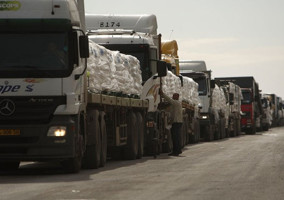Muslim charities in the UK are facing increasing difficulties in accessing banking services despite government moves to ease them, the head of an umbrella body has warned.
Fadi Itani, chief executive of the Muslim Charities Forum, said that most of his organisation’s members are facing issues with banks, with some struggling to transfer money overseas and others unable to access any services at all.
This is despite the Sanctions and Anti-Money Laundering Act being introduced in 2018, which was heralded as “a crucial step in the right direction” towards aid charities being able to access mainstream banking channels without having their accounts frozen.
Many mainstream banks consider NGOs to be at risk of money laundering because some of them operate in high-risk environments such as Syria or Palestine.
To protect against this, some banks employ “de-risking” practices, whereby they slow down transactions, freeze or close accounts which they think could be at risk of breaches in regulation, particularly around money laundering and counter-terrorism.
Itani said that the issue of de-risking “did not go away” for Muslim charities since the Act’s introduction and that many were “suffering in silence”.
“Maybe for some [the situation has improved], but actually, for the Muslim charities in general, this issue of derisking and banking has been really ongoing, did not really go away,” he told Civil Society News.
He added: “And the concern we have, which we received through regular updates from charities on this issue, is that it is actually getting deeper.”
‘Hidden discrimination’
Itani said he understood that banks needed to protect themselves from penalties but argued that the charities struggling to access services were “low risk”.
“We start to feel that there is a hidden discrimination against certain charities because of the names, the areas they work in, and so on,” he said.
He called for greater clarity from banks on what they required from charities in order to provide uninterrupted services to them.
“What is missing at the moment [is] a clear framework from banks, what they expect from charities, what is required, what is needed, in order to continue providing services, because they're expecting charities to be transparent in their work, which is understandable, and we encourage and support and we insist on this,” he said.
“But at the same time when they're making decisions to stop banking or close accounts, they're not transparent at all with why they are doing the decisions.”
Itani's comments follow research by the Civil Society Group earlier this year, which found that many charities were facing increased challenges in appropriately managing their finances due to many struggling to find banking services that meet their needs.
Charities reported difficulty accessing physical branches and free accounts, and experiencing onerous bureaucratic processes with lack of understanding about the needs of charities from bank staff.
Itani will chair the Faith Charities Forum on 14 September.












